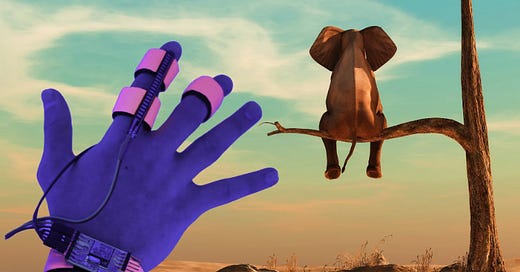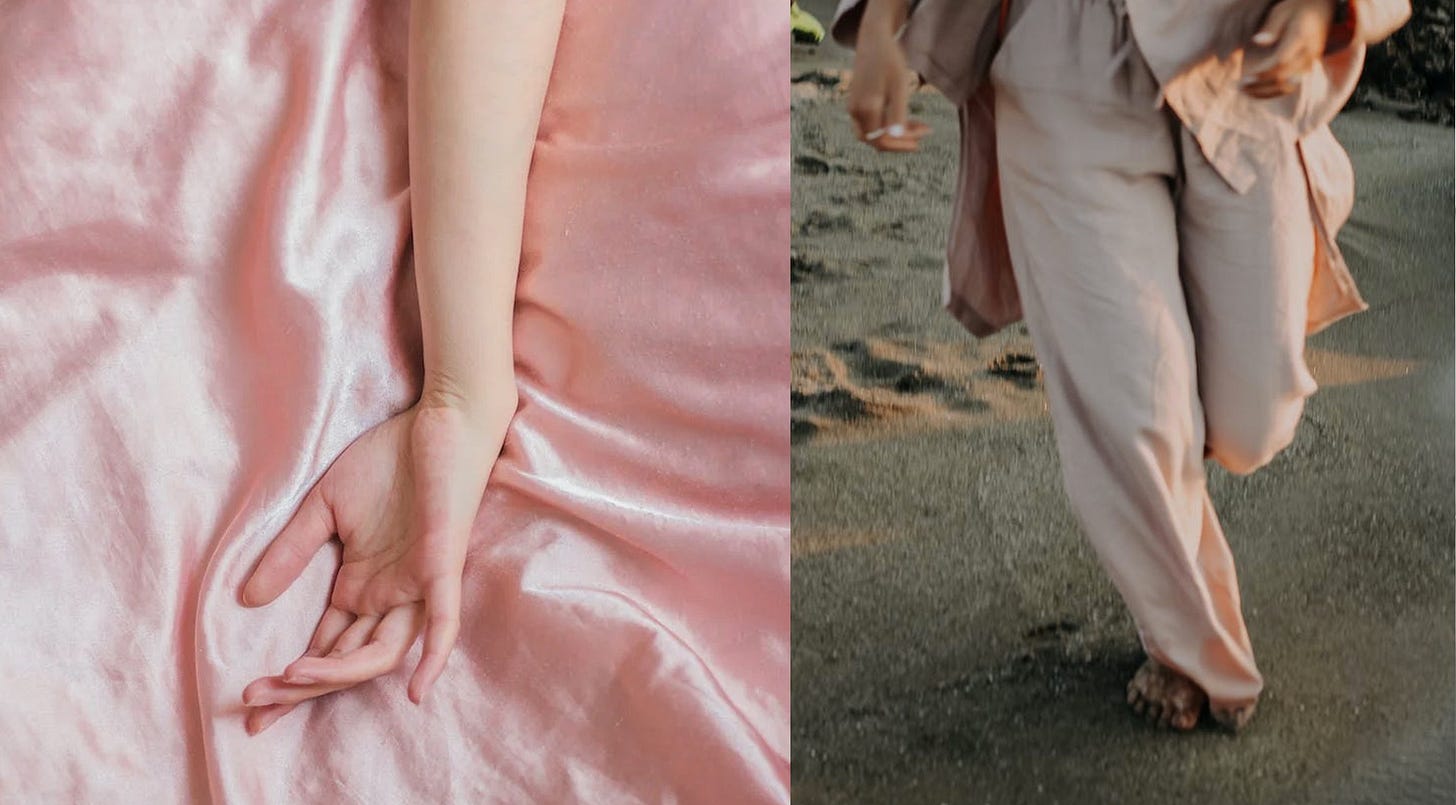🍄 When We Are Asleep in This World, We Are Awake in Another
Dream Engineering: Electrode dreams, REM awareness, dream-hacking health
From the minds of Sputnik Futures. Exploring every rabbit hole there is. For more wanderings, become an Alice in Futureland subscriber—it's free.
🍄 AudioDose: this is Alice on Sonic Mushrooms. Dream on here.
🎧 Alice in Futureland Podcasts
📘 More on consciousness and dreaming in our book Tuning into Frequency.
Hello, we’re Alice and we are always in a state of wander. The dream state is the next chapter for conscious control, as researchers are learning to measure how we can learn while sleeping … which brings me to my next question, “Where do you go when you sleep?”
(Suggestions from the waking world infuse dreams in MIT experiments. Image credit: Fluid Interfaces group, MIT Media Lab/Shutterstock)
🧠 Dream Engineering: Believe the Hypnagogia
MIT’s Dream Lab has designed wearable tech to control the content of dreams. Measuring heart rate and muscle flexion, the Dormio glove detects when the dreamer is in the hypnagogic state of consciousness – during the onset of sleep. It then gives an auditory prompt to influence the dream, such as the word “tiger,” that was used during research. The team has found that by repeating phrases during the hypnagogic state, there is potential to rescript nightmare scenarios before they happen.
🧠 Together in Electrode Dreams
Off to the land of nod once-for-yes, where scientists have been conversing with dreamers in their sleep. During multiple global studies, lucid dreamers are able to answer simple questions and respond to math equations in real-time. Scientists at Northwestern University have communicated words, sounds or flashing lights to sleepers in an REM sleep state, who then responded using coded eye movements or facial muscle contractions. They are even lucid enough to correct any mistakes. Nikola Tesla, Salvador Dalí, Ludwig van Beethoven and Isaac Newton all credited hypnagogia with increased creativity. “You can make the argument that REM sleep is kind of a neglected resource,” says Dr. Benjamin Baird, a research scientist at the Center for Sleep and Consciousness at the University of Wisconsin-Madison. People who post their experiences with lucid dreaming in online forums often report how it inspired new works of music or fiction, and helped them brainstorm solutions to real problems. Inventor Thomas Edison would hold metal balls in his hand until he dozed off – the relaxing of muscles as the hypnagogic state passed into deeper sleep, would cause the balls to fall and wake him, allowing him to remember what he had been dreaming about.
🧠 REM sleep: You really are looking around in your dreams
Why do humans and other animals undergo rapid eye movement (REM) while they sleep? Many scientists have assumed it’s because REM sleep is closely associated with dreaming and our eye movements correspond to us looking around in our dreams. Up to now unproven, this hypothesis was strongly supported by experiments at the University of California, San Francisco that monitored the brains of sleeping mice. The UCSF researchers found that the direction and amplitude of eye movements during REM sleep correlated with activity in a system of neurons corresponding to the animal’s head direction when awake. Similarities between mammalian brains suggest the same correlations exist in sleeping people, and it opens the door to new therapies designed to interfere with or delete unwanted memories by modulating eye movements during REM sleep. Inception, anyone?
🧠 Dream Learner
You can learn foreign words as you sleep—but it won't make you fluent. People who were played translations in their sleep could recall which category of words they belonged to when they woke up. (New Scientist).
🧠 Talking in Your Sleep
It turns out lucid dreamers can go one step further and answer questions while sleeping. Scientists at Northwestern University questioned people deep in dream-filled REM sleep—and those dreamers actually answered basic questions by moving their eyes back and forth.
Dream Hacking for Health
🎧 The following excerpts are from the ALICE podcast with dream engineer and researcher Michelle Carr.
There was a study that looked at when two people are sleeping in the same bed that their sleep rhythms will start to synchronize to some extent, which on the one hand could be, you know, that if somebody moves in bed, kind of wakes up the other person, so it could be mechanical. But it's not far-fetched to think that it's electrical, that your brain is entering certain rhythms and the person next to you starts to synchronize on some level. We see that in waking studies as well, that if you're in a room with someone, your heartbeats might start to synchronize, and this is a real physical signal that's being emitted into the space around you.
Our dreams are creating real physical manifestations. When I dream that I'm being chased by a threatening character, my heart rate increases, my breathing rate increases. And that affects the space around me too. It might affect my partner. They might have a bad dream because I'm having a bad dream. There's still a lot to explore.
There's also another kind of thing that this taps into—what is the relationship between dreaming and health? Can our dreams predict when we're ill, or give us evidence when we're going to be developing disease? Maybe, you know, if on some level part of the body is developing cancer or something, does the dreaming mind kind of give us some information about that because on some level our body and our physical system is aware that something is happening?
There's some work on the end of life dreams, on dreaming of death or dreaming of interacting with deceased people. There are different lenses to try to understand how that's happening. Do we dream of someone who's deceased just as a psychological projection? Or is it that we are accessing something spiritually? I mean, it depends on what your beliefs are, but I think there's a lot of potential for study in these fields.
🔍 Lucid Dreaming Is Linked to Better Morning Mood
Besides being a treatment for nightmares, the experience of lucid dreams in general may be associated with better mood in the morning.
Craving more?
📘 Alice in Futureland books
🎧 Alice in Futureland Podcasts
🎧 Benefits of Lucid Dreaming with Michelle Carr, dream engineer & Dr. Stephen LaBerge, psychophysiologist specializing in the scientific study of lucid dreaming (from the archives)
🎧 Creativity, Consciousness and Lucid Dreaming with Michelle Carr, dream engineer & Dr. Stephen LaBerge (from the archives)
🎧 Dream Yourself Well with Michelle Carr & Dr. Stephen LaBerge (from the archives)
👁🗨 Practice Your Sleep Onset State with Michelle Carr, dream engineer
Thanks for tuning in.
For more wanderings, become an Alice in Futureland subscriber—it's free.
Invite your friends to this mad tea party and let's see how many things we can learn before breakfast.
©2023 Alice in Futureland







Trying to fit dreams into the materialist/reductionist paradigm is a joke.
MIT for gods' sake!